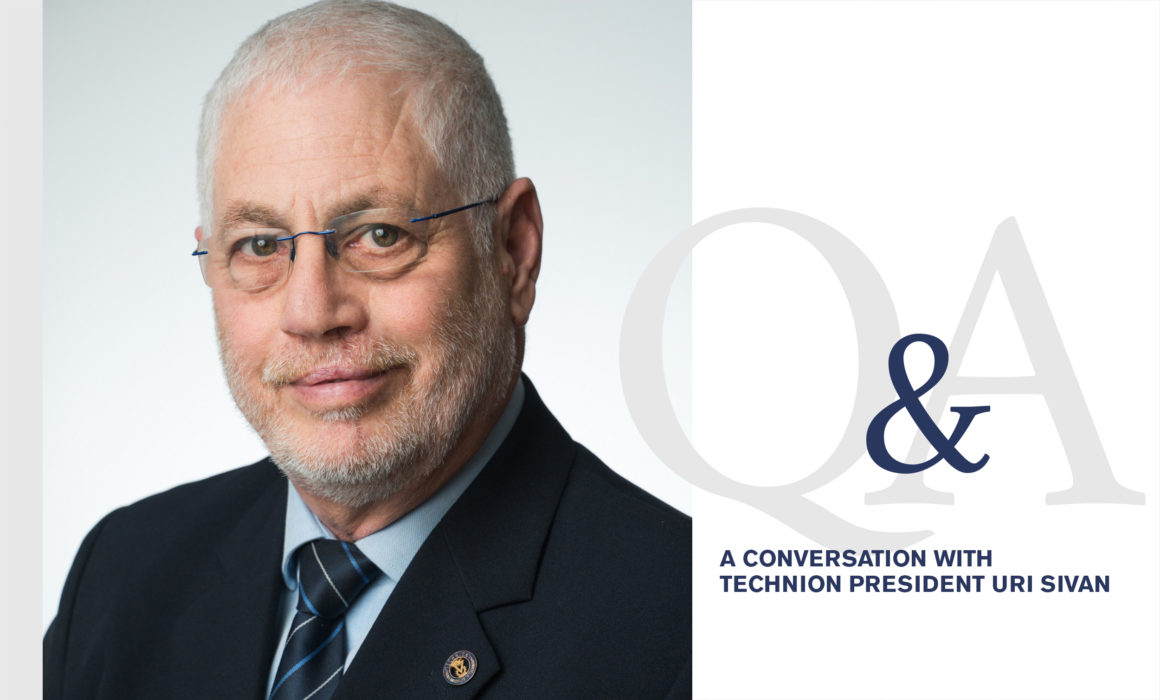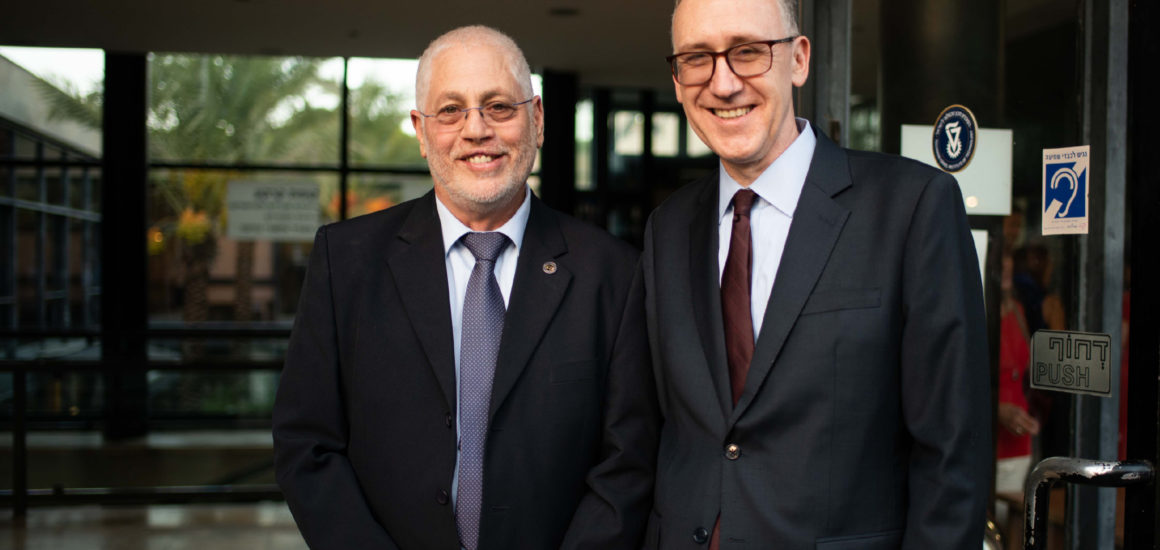Prof. Uri Sivan and ATS CEO Michael Waxman-Lenz
Technion President Uri Sivan entered office on October 1, 2019 — just before COVID-19 spread rapidly across the globe. American Technion Society (ATS) CEO Michael Waxman-Lenz spoke to him recently to learn more about leading a world-class science institution in combating a pandemic, and about his broader goals and vision for the university. As the institution’s 17th president, Professor Sivan has a rich legacy to draw on — and despite the current challenges, a bright future to create.
Michael Waxman-Lenz: Your tenure as president began just as the coronavirus was starting to spread. Can you give us a glimpse into what went on during that time for you and the university?
Uri Sivan: It was a challenging start! But it showed me right away how robust and flexible the Technion is at all levels. Firstly, we moved to fully online learning in just 10 days for all classes for over 15,000 students.
Secondly, within less than a month, more than 50 labs around campus diverted their research to COVID-19 related challenges. The range of topics was dazzling, from AI and big data to diagnostics, drug delivery, and improving protective gear. That gear, by the way, is in use in Israel and in the U.S.
Can you give us more detail on what Technion labs are working on and on what they have already achieved?
With many projects in development, it would be impossible to do justice to all of them, but here are some examples.
Professor Josué Sznitman, from the Faculty of Biomedical Engineering, is working on a project that started long before the coronavirus, but it addresses one of the virus’ main challenges to treatment: effectively transferring drugs to the lungs.
Another project, from Professor Naama Geva-Zatorsky of the Rappaport Faculty of Medicine, is the development of a simple at-home diagnostic kit to test for the virus. This is in very advanced stages of trials and, if successful, it will be a game-changer.
Professor Ezri Tarazi, from our Industrial Design Program, has designed protective gear for frontline medical staff. His device directs a curtain of air across a face shield, pushing pathogens away, clearing the protective screen, and keeping the wearer cool.
What have you been surprised to learn or happy to witness since the start of your presidency?
I have been heartened by the solidarity between our staff, faculty, students, and supporters. When the crisis started, most of our students lost their jobs, and many lost their family’s financial support. But we found it unacceptable for even one student to quit school due to economic hardship. So, with the help of the American Technion Society, the Israel Technion Society, and other organizations around the world, we established funds for student support and for research. Also, in cooperation with our senior faculty organization, we established a fund for staff’s and teachers’ families experiencing loss of income or other challenges. Our supporters have been very generous, and everyone appreciates feeling like they are not alone. It has been heartwarming. You can see that we really are a family.
Prof. Uri Sivan
“Our vision is to provide the best education to serve society and educate the leaders of tomorrow, carrying out cutting-edge research for humanity, and serving as a beacon for pluralism, equality, and freedom of speech.”Prof. Uri Sivan
What do you envision will be the most important reforms for the university over the next decade?
There are three major areas where we have work to do: increasing the interdisciplinary nature of research, expanding the role of the university, and rethinking the connections between academia and industry.
The traditional university structure is based on separate faculties and disciplines — but the grand challenges of the 21st century are multidisciplinary by nature. Human health, for instance, spans practice and research in many areas: medical, biological, engineering, data science, etc. A major challenge, especially at a university like the Technion, is to bridge those disciplines. To do that, we are restructuring research around major challenges of the 21st century: human health, energy sustainability and environment, and advanced manufacturing.
Universities have lost their monopoly over information as a commodity. Anyone can find answers via Google or on Wikipedia, or take online courses on any topic. So, the role of a university is to do more than teach. It should mentor students and give them a broader perspective. To that end, we are currently crystalizing a program we call “The Rounded Engineer,” to educate the leaders of tomorrow, giving students not just knowledge in their discipline, but societal perspective, environmental awareness, familiarity with issues of diversity, and ethics.
There has been a tectonic change in the traditional division of roles between academia and industry, with the two focusing on fundamental and applied research, respectively. With these changes, we need to figure out how to live with each other. One thing we are doing is bringing industry deeper into campus, with more teachers and mentors coming from industry. Another is streamlining technology transfer from the Technion to industry.
What role does philanthropy play in the growth and development of a university?
Philanthropy is absolutely critical. Our development depends on philanthropy — new labs, infrastructure, and funding high-risk research. Without it, we could not maintain our status as a leading technological university.
How do you view the academic spirit at Technion? What challenges does it face in today’s climate, and how do you plan to preserve it?
As we touched on before, a university in my perception is far more than just teaching. We need to educate people, to let them develop into rounded human beings sensitive to their environment, to their communities. We would like our graduates to be responsible for what happens around them, in addition to, of course, being excellent professionals. A wonderful project run by [Professor of Mechanical Engineering] Alon Wolf creates sophisticated artificial limbs for children, and the effect is incredible — for the recipients but also for the students working on it. They see the ways technology can really affect society.
Your parents came to the Technion in 1936 because European universities had closed their doors to Jews. What are you doing to preserve and expand the university’s commitment to pluralism and diversity?
If you read the Technion vision from the 1920s, when the university had just opened its gates, you will see a clear statement that it should serve all people — Arabs, Jews, immigrants, and others, with no discrimination for sex, religion, or anything else. That has been the philosophy right from the beginning. We will do whatever it takes so that everybody feels comfortable on campus. Our vision is to provide the best education to serve society and educate the leaders of tomorrow, carrying out cutting-edge research for humanity, and serving as a beacon for pluralism, equality, and freedom of speech.
Thank you, Uri, for sharing your thoughts, vision, and goals for the Technion during coronavirus and beyond. Is there anything else you would like to add?
We are overwhelmed by the friendship and partnership of our supporters. Not only do we have their moral support, their participation, and their partnership in our vision, but also their support is critical in helping us to maintain our standards and pursuit of our long-standing values. It’s heartwarming to have such supporters, some of whom go back four generations. I am proud of being part of that family.



